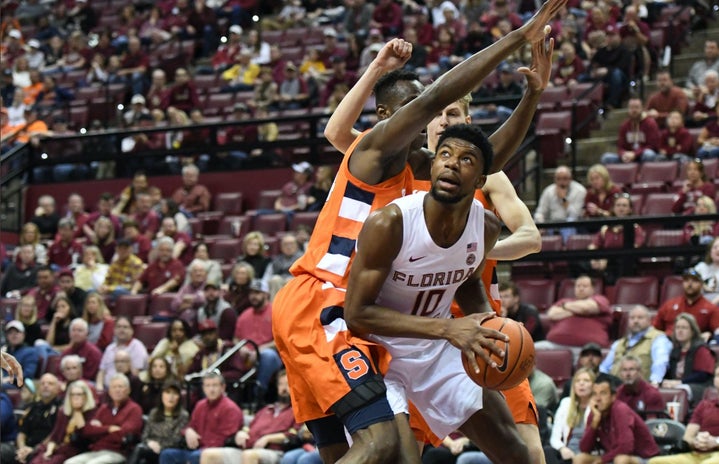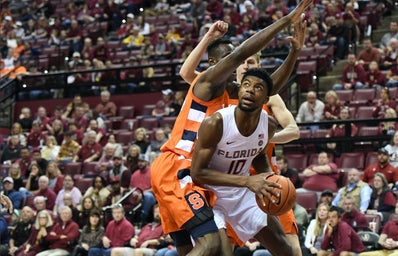If you know anything about the state of Seminole sports, you know that Florida State is a basketball school (at least, it has been for the last few years). I got the chance to talk with someone who works directly with these star athletes—Brittany Mills, an FSU athletic training student. She talked all about her experience working with the men’s basketball team, taping ankles, icing injuries and more. If you want the inside scoop about practices with the FSU men’s basketball team and the athletic training major, you’ve come to the right place.
Her Campus (HC): Why did you decide to major in athletic training? How did you hear about the program?
Brittany Mills (BM): I went into advising to change my major to Exercise Physiology, and my advisor recommended that I take the Intro to AT class just in case I decided to apply. I hadn’t heard anything about the program until that day, to be honest.
HC: How does the athletic training program work?
BM: You have to take the Intro class in order to apply, and they walk you through the application process throughout the semester. There are four different tracks or sub-plans in the overall major: AT, PT (physical therapy), PA (physician assistant) and MD (sports medicine), but only those in the AT track get to work with FSU Athletics. Those of us who were trying for the AT route had to go through a panel-style group interview, while the other sub-plans did an individual interview with the Career Center.
HC: How did you get assigned to the basketball team? Was it your first choice?
BM: You don’t get to request any specific rotations until your second year, and last spring, when we got to turn in preferences, my top choice was basketball, but I didn’t specify men’s or women’s.
HC: What does a typical day at basketball practice look like for you?
BM: We get there an hour before practice begins to set up water coolers, make Powerade, fill their water bottles and help our certified trainer get everyone taped and ready to go. Sometimes this will include helping get all the guys prewrapped or doing pre-practice treatments. When practice starts, we’ll do rehab exercises with athletes if anyone is recovering from an injury. I really enjoy this part because I get to learn new ways to rehabilitate specific injuries. A lot of it is just being there for the players in case they need anything and helping our preceptor (the head AT) with anything. After practice, we tear everything down (put away coolers, dump and clean their bottles) and then do treatments. Post-practice, we see a lot of icing (i.e., we use flexi-wrap and wrap ice bags on any body part that’s aching that day), and it changes every day on the volume of players who will come through to get something done.
HC: Were you ever intimidated to work with the basketball team? Has that feeling changed over time?
BM: I was definitely a little nervous to work with the team, mainly because I was really excited about the opportunity and wanted to do my best. I’ve been working with the team since October and am the only AT student right now who has been with the team the whole time. As with everything, once you spend more time with people, you tend to get more comfortable in your role and with those around you. I thoroughly enjoy every single day I go to work with the team. I can joke around and be myself, which makes it so much better.

HC: Have you worked with other teams at FSU? If so, which experience has been your favorite overall?
BM: My first rotation in fall 2019 was with the Women’s Tennis team, and then for part of spring 2020 I worked with the Track & Field team. I don’t think I could pick a favorite between those two experiences because I truly enjoyed both and have favorite aspects of working with each team. The tennis team was relatively small (there were only seven girls), and I enjoyed knowing all the athletes I was working with. That wasn’t the case with T/F, obviously due to the sheer number of athletes involved with that sport. However, I got to see more injuries and conditions that were being diagnosed, treated and rehabilitated. I am very lucky to have had amazing preceptors on each team I’ve worked with who take time to teach about commonly used special tests, different pathologies and conditions we might see as certified trainers in the future. We would learn things we hadn’t been taught in class yet or wouldn’t really be taught in-depth in our classes, and I’m very grateful to have had that.
HC: What is one team you haven’t worked with that you would like to work with if you had the opportunity?
BM: I’m very grateful for all of the teams I’ve gotten to work with at FSU, and if I had one more rotation I could work and I couldn’t rechoose any of those I had already worked with, I’d probably choose soccer.
HC: What are your next steps after graduation?
BM: I’m taking a gap year before going to grad school to get my master’s in AT. It’s a two-year program, and I’ve already started looking at schools. I made this decision as the schools I’m looking at are just now beginning their master’s programs, and I want to see how their first year goes. I also want to give the athletic world time to get back to a more relative normal before going to grad school.
HC: Do you have a dream career or team you want to work with? If so, who and why?
BM: My time with the men’s basketball team has honestly changed my dream career a lot more than I expected. I used to always only want to work with a collegiate gymnastics team, and while I still hope to get that opportunity, I would love to work with collegiate basketball. It is such a fun atmosphere, and the teams are at a good size where it isn’t too small, but you still know all of your athletes well. Especially while I’m young, I would love to have the opportunity to work and travel with a collegiate basketball team.
HC: What advice would you give to someone applying for the athletic training major?
BM: My biggest piece of advice to somebody applying: Be yourself and be confident in yourself. I truly didn’t think I would get accepted into the program after my interview, but you have to remain true to yourself and believe that they might see something in you that you don’t always see in yourself.
Advice to somebody who has just gotten accepted: Be ready to learn. Every opportunity, every experience, every moment of your clinical rotations with these athletes and certified trainers is a learning moment. From specific injuries and conditions, emergency plans and situations, to just watching how your preceptor interacts with coaches and athletes—you can always be learning something.
Want to see more HCFSU? Be sure to like us on Facebook and follow us on Instagram, Twitter, TikTok, YouTube and Pinterest!



